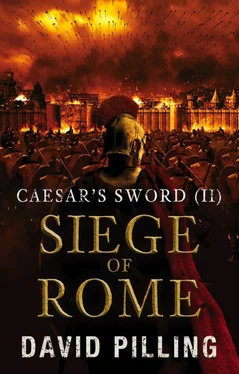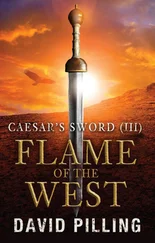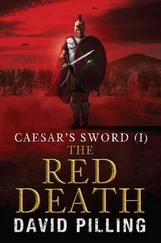David Pilling - Siege of Rome
Здесь есть возможность читать онлайн «David Pilling - Siege of Rome» весь текст электронной книги совершенно бесплатно (целиком полную версию без сокращений). В некоторых случаях можно слушать аудио, скачать через торрент в формате fb2 и присутствует краткое содержание. Год выпуска: 2013, Жанр: Исторические приключения, на английском языке. Описание произведения, (предисловие) а так же отзывы посетителей доступны на портале библиотеки ЛибКат.
- Название:Siege of Rome
- Автор:
- Жанр:
- Год:2013
- ISBN:нет данных
- Рейтинг книги:3 / 5. Голосов: 1
-
Избранное:Добавить в избранное
- Отзывы:
-
Ваша оценка:
- 60
- 1
- 2
- 3
- 4
- 5
Siege of Rome: краткое содержание, описание и аннотация
Предлагаем к чтению аннотацию, описание, краткое содержание или предисловие (зависит от того, что написал сам автор книги «Siege of Rome»). Если вы не нашли необходимую информацию о книге — напишите в комментариях, мы постараемся отыскать её.
Siege of Rome — читать онлайн бесплатно полную книгу (весь текст) целиком
Ниже представлен текст книги, разбитый по страницам. Система сохранения места последней прочитанной страницы, позволяет с удобством читать онлайн бесплатно книгу «Siege of Rome», без необходимости каждый раз заново искать на чём Вы остановились. Поставьте закладку, и сможете в любой момент перейти на страницу, на которой закончили чтение.
Интервал:
Закладка:
David Pilling
Siege of Rome
Prologue
Abbaye de Rhuys, Brittany, 570 AD
The glory of Britain is dead. News has reached our monastery of a battle fought in the west of the island, not far from the scene of Arthur’s great victory at Mount Badon.
On this occasion it has pleased God to allow the Saxons the victory. No less than three British kings were left dead on the field, their blood mingled with that of five thousand British warriors.
The Saxons, they say, attacked at dawn, while the Britons were still wallowing in their beds. In their arrogance and complacency, our kings did not think to post any guards.
Now the whole of western Britain lies open to the invaders. Our crops shall fill pagan bellies. Fire and sword shall consume our undefended towns. Woe to the people! God have mercy on them, who shall now be conquered and enslaved.
My fires are not all burned out. A flicker of life yet courses through these withered veins, and the incompetence of those charged with guarding the land of my birth fills me with as much rage as sorrow.
It is the custom of old men to decry the state of the world as it is now, and to recall with misty-eyed fondness the glories of their youth. I am reluctant to follow the same path, but the fact remains that Britain is degenerate, and her warriors a pale shadow of their forefathers. Would Arthur, my mighty grandsire, have been caught with his breeches down by a pack of yelping Saxons? Would any of his captains, proud Cei or matchless Bedwyr?
Perhaps I pay too much heed to legend. I never knew my grandsire or any of his men. Their bones lie mouldering in the soil of a dozen battlefields. No more shall Arthur’s legion ride forth from Caerleon under the dragon banner, to strike terror and a kind of awed respect into Britain’s foes.
Nor have I set eyes on Britain since my early childhood, save a glimpse of its green shores across the sea on clear days. My fate was to serve in distant lands under a foreign chief. His name was Flavius Belisarius. The Pillar of the East, as the Romans called him, a man every bit as great as Arthur.
It is the fate of great men to be betrayed. Arthur was betrayed, and so was Belisarius. How I have wept and prayed for their souls. Foolish, helpless, driveling old man that I am, eking out my declining years in this cramped little cell. Of all the afflictions Gods sends to test His creation, old age is the worst.
I can dimly recall a better time. In my mind’s eye I see the city of Rome, restored to something like her former grandeur. The Eternal City, ancient capital of the greatest empire the world has ever known.
And yet she is threatened. Her walls encompassed by a hundred and fifty thousand baying Goths, while scarcely a tenth that number of Romans hurl defiance at them from the ramparts.
I see Belisarius, our golden general, snatching a bow from one of his archers and putting an arrow through the gullet of a Gothic chief.
“Courage, Romans!” he cried above the approving roars of his men, “have no fear of these barbarians. Maintain your trust in God, cast your javelins and spears down on their heads, and you shall see them run.”
The defence of Rome was his greatest exploit. Who else could have held her against overwhelming numbers of Goths, while the cowardly citizens threatened to stab him in the back at any moment, and his own troops whined and begged to go home?
Who else could have broken my heart so completely? Even now, after the passage of thirty years, the wound has not healed.
I see the general on his white-faced bay, racing across the plain by the banks of the Tiber at the head of his guards. Six times his number of Gothic cavalry stand between us and the gates of Rome.
“That is Belisarius! Kill the bay!”
The cry erupts from pagan throats. They charge. The sky darkens with steel-tipped rain. Spears, arrows and javelins hammer against my shield. We close around the general. He must be protected at all costs. Without him, our army is a rag-bag of mercenaries and conscripts. With him, we are the Roman legions reborn.
My hand closes around the hilt of Caledfwlch: the sword that Arthur held aloft at Mount Badon and buried in Medraut’s guts at Camlann. Julius Caesar’s sword, also known as The Red Death, forged by the gods on Mount Olympus.
The sword flames into life. The triumphant war-shouts of the enemy turn to fear and dismay. We are among them. Their guttural voices ring in my ears. Their hot blood whets my grandsire’s blade.
Better times. I shall take a little wine, and then take up my pen again to write of Belisarius’ greatest victory.
My greatest defeat.
1.
It took me three weeks to recover from the fight in the Hippodrome. I had killed Leo, the traitor and ex-charioteer, but he left me with a broken arm and a fractured jaw.
Belisarius had his guards carry from the arena. The crowd was still chanting my name as they laid me on a stretcher. Delirious with pain, I flickered in and out of consciousness, barely aware of my surroundings. The taste of victory was in my mouth, along with the salt tang of blood.
They carried me through the empty streets to a sanatorium not far from Belisarius’ house. He could not shelter me in his own house, for that would have been perceived as a deliberate insult to the Empress Theodora. It was public knowledge that she wanted me dead, and had sponsored Leo as her champion. His death at my hands was a serious defeat for her, and one she would thirst to avenge.
Belisarius appreciated the danger I was in. He posted six of his men to watch over me while I recovered. They were Huns, brawny mercenaries from Scythia, and he put his trust in them over our own people. Theodora’s influence spread like an ever-expanding net over the city. There were few among the citizens she could not bribe, threaten or manipulate into doing her will.
Towards the end of my recuperation, the general visited me in person. He came at night, hooded and cloaked, and alone.
I woke from an uneasy sleep to find his narrow features staring down at me. Hollow-cheeked and balding, he still looked more like a priest than a soldier, though his wiry, meatless frame possessed enormous strength and skill at arms. The flame of the tallow candle next my bed reflected in the pits of his large, expressive eyes.
“General,” I croaked, endeavoring to sit up, but he placed his hand against my chest and gently pressed me back against the pillows.
“Conserve your strength,” he said, “you will need it soon enough. Are you mending? How is your arm?”
I cautiously tried to bend my right arm, which until the previous morning had been held straight in a splint. Leo had broken my elbow during the fight in the arena.
The priest at the sanatorium kept the pain at bay by dosing me with alcohol and poppy juice. His potent medicine kept me in a semi-delirious state for days on end, during which time I suffered terrifying hallucinations. Gradually he lessened the dose, and the devils faded from view.
Relief washed over me as I found that I could bend the arm without too much pain, save a dull ache that throbbed up and down the limb, and flex my fingers.
Belisarius smiled. “Good,” he said, “the arm will be weak for a while, but nothing is broken beyond repair. Open your mouth.”
I obeyed without question, wincing as pain stabbed through my jaw. Leo, may his soul baste in fire in the lowest circle of Hell, had dislocated it with his knee.
Belisarius tilted my face towards the light. “You have lost four teeth,” he said, “I saw them on sale outside the gates of the Hippodrome, the day after your triumph. You are something of a hero among the people, Britannicus Minor.”
Читать дальшеИнтервал:
Закладка:
Похожие книги на «Siege of Rome»
Представляем Вашему вниманию похожие книги на «Siege of Rome» списком для выбора. Мы отобрали схожую по названию и смыслу литературу в надежде предоставить читателям больше вариантов отыскать новые, интересные, ещё непрочитанные произведения.
Обсуждение, отзывы о книге «Siege of Rome» и просто собственные мнения читателей. Оставьте ваши комментарии, напишите, что Вы думаете о произведении, его смысле или главных героях. Укажите что конкретно понравилось, а что нет, и почему Вы так считаете.












